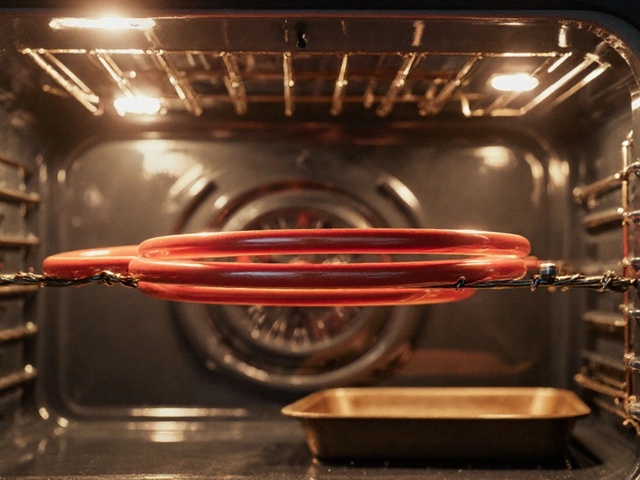Ever stared at your washing machine and wondered what’s really going on inside? Surprisingly, understanding your home appliances isn't rocket science. Knowing the basics can mean fewer repair bills and a lot less frustration.
Let's peel back the mystery behind these everyday heroes. At the heart of most appliances are pretty simple mechanisms put together ingeniously. Understanding these basics will let you maintain your machines better and even handle minor hiccups yourself.
Regular maintenance isn't just a fancy term. It’s about simple things like cleaning filters, checking seals, and making sure you’re not overloading your trusty dishwasher. Spending a little time every now and then can really stretch an appliance's lifespan—like getting an extra year from your fridge by just vacuuming its coils. Yup, it's that simple.
- Understanding Appliance Basics
- Everyday Maintenance Tips
- Troubleshooting Common Problems
- Surprising Appliance Facts
- When to Call a Professional
Understanding Appliance Basics
Ever wondered why your blender whirs, your fridge hums, or your washing machine dances a little jig? Well, let's break it down. Home appliances largely consist of a few key elements: motors, belts, sensors, and electronic controls. These parts work together like a well-oiled machine, literally and figuratively.
Let's take motors, for example. Think of them as the heart of your appliance, providing the power to get things moving. Motors spin your washer drum and make your vacuum cleaner suck up all that dirt. They’re tough but can overheat if overworked—like running your blender for a smoothie marathon!
Belts, on the other hand, are like the muscles. They transfer the motion from the motor to different parts of the appliance. A broken belt in your dryer? It's not tumbling, and your clothes aren't drying. Luckily, swapping out a belt is easier than changing a bike tire.
Then we have sensors and controls—the brainy bits of the operation. Sensors tell your dishwasher when it’s clean enough or your oven when it’s hot enough. Sometimes they can misfire, thinking the job's done when it's not, leading to half-done dishes or undercooked pizza. When this happens, simply resetting the appliance can often fix things.
- Check the motor—keep it dust-free and allow it cool down.
- Inspect belts for wear and replace when necessary.
- Reset or recalibrate sensors if you notice odd behavior.
Understanding these basic elements can really demystify how your home appliances tick, making DIY maintenance feel less daunting and more like a savvy homeowner move.
Everyday Maintenance Tips
Want to keep your home appliances in tip-top shape without spending a fortune? Regular maintenance is your best buddy. It's all about those small steps that make a big difference in the lifespan of your gadgets.
First up, let's talk about your washing machine. Make it a habit to check the hoses for leaks or bulges every month. You don't want to come home to a surprise pool in the laundry room, right? Also, never overload it. Overstuffing can lead to poor washing results and strain the motor.
Your refrigerator comes next. Twice a year, vacuum the coils on the back or bottom—dust and grime decrease efficiency, making your fridge work harder than it should. A simple five-minute job can cut energy usage by up to 30%! Also, confirm your fridge's temperature is around 37°F. It keeps your food fresh without consuming excess energy.
Now, for the trusty dishwasher. Ensure the filter is clean by checking it once a month and removing any trapped food particles. A clean filter and a little vinegar rinse every so often keep your dishes spotless!
For your oven and stovetop, clean the burner grates and inspect the gas burners for clogs. A sponge and some soapy water can do wonders here—trust me!
And don't forget about the dryer. Clear out the lint filter before or after each load to prevent overheating and potential fires. It also helps your clothes dry faster, saving both time and energy.
Here's a quick way to remember these chores: appliance maintenance follows the same principle as a tidy home. A little regular care keeps everything running smoothly.
| Appliance | Maintenance Frequency |
|---|---|
| Washing Machine | Check Monthly |
| Refrigerator Coils | Twice a Year |
| Dishwasher Filter | Monthly |
| Dryer Lint Filter | After Each Use |
By adding these tips into your routine, you’ll increase your appliances' lifespan and save on costly repairs. Plus, you’ll be the hero of your own home, keeping everything working like a charm!

Troubleshooting Common Problems
Troubleshooting home appliances can feel daunting, but you're about to become a pro at it. Most issues are simpler than they seem, and with a bit of patience, you might solve them without picking up the phone for service calls.
Your washing machine isn’t spinning? First, ensure it's balanced. Unbalanced loads can cause a spin cycle to go haywire. Check inside; redistribute clothes evenly. If it's still not cooperating, inspect the lid switch. A faulty one can keep it from engaging properly.
Dishwasher leaving spots on your glassware? You might want to check the filter and spray arms. Clogs here affect cleaning power. Also, hard water can leave a chalky residue, so consider using a rinse aid for that sparkling finish.
The fridge isn’t cold enough? Don’t panic. Check the thermostat setting—it may have been nudged inadvertently. Next, examine the door seals. Worn gaskets let out cool air. A quick test: close the door on a dollar bill. If it slides out easily, you’ve found the culprit.
- Washing machines: Balance the load, check the lid switch.
- Dishwashers: Clean filters and spray arms, use rinse aid.
- Fridges: Adjust the thermostat, test door seals.
These quick checks can solve many appliance woes, but if an issue persists or involves electrical components, play it safe and ring a professional. It's better to be safe than sorry when dealing with potential electric hazards.
Surprising Appliance Facts
So, you think you know your home appliances? Let's dive into some quirky facts that might change the way you look at your household gadgets. Starting with something as mundane as a refrigerator: did you know they've only been around since the early 20th century? Before that, people used iceboxes. Yeah, real blocks of ice kept foods cold.
Ever wondered why dishwashers are great at cleaning? It's not just hot water and detergent—it's the pressure. The spray arms inside pump water at high speed, ensuring no grease or grime stands a chance. Plus, dishwashers use less water than washing dishes by hand. Save time and the planet.
Let's not forget about microwaves, the magic boxes that heat our leftovers. These use electromagnetic waves that make water molecules in food move, creating heat quickly. Incredibly efficient, they were discovered accidentally during radar experiments in World War II. Imagine finding out your snack could be heated faster while working on war tech!
Speaking of efficient, modern washing machines are designed to use much less water than older models, yet clean clothing better. In fact, they can use nearly 50% less water. A washing machine's lifespan is around 10-12 years if you follow those maintenance tips. A simple habit like using the right amount of detergent can prevent build-up and unnecessary wear.
Have you ever really thought about how your vacuum cleaner achieves its dirt-busting prowess? It’s all about suction, which is created by a motor spinning a fan. This decreases air pressure inside the vacuum, pulling in air and debris. But wait, there’s a stat worth noting: the average household accumulates about 40 pounds of dust annually, so regular vacuuming isn't just a neat freak's obsession—it's necessary!
Here’s a cool fact for the tech lovers: smart fridges can connect to the internet to keep track of groceries, suggest recipes, or even stream music and videos. Imagine cooking up a storm while jamming to your favorite tunes directly from your appliance! High-tech or not, understanding your appliances makes it easier to keep them running smoothly.

When to Call a Professional
Alright, so you've done all you can, but your trusty appliance still has a mind of its own. Sometimes it's just time to call in the pros. Knowing when to make that call can save you time and prevent further damage.
First off, if your appliance shows any signs of electrical issues like sparking, a burning smell, or constant tripping of the breaker, don't attempt a DIY fix. Electricity isn't something to mess around with, and a professional can safely diagnose and repair the issue without turning your home into a scene from a disaster movie.
Another biggie? Leaks. Water and appliances don't mix well. If your washing machine is creating its own little ocean on the floor or your fridge leaks more than a leaky faucet, it's time to call someone who knows their stuff. They can figure out if it's a simple seal issue or something more serious.
Appliance noises can be unnerving, but they're often indicators of underlying problems. A clunking noise from the dryer or grinding from the dishwasher could signal worn-out motors or loose parts, both of which require professional expertise to fix.
- Electrical issues like sparking or tripping breakers
- Water leaks from any appliance
- Unusual, loud noises
- Appliance not turning on at all
If your appliance just won’t turn on, despite trying all the troubleshooting tips, it might be an internal problem like a broken switch or blown fuse. A technician can do a deep dive into the internals and get things back on track.
Lastly, remember that trying to repair something without the right tools or knowledge can sometimes void warranties. So, when in doubt, call for backup and let the experts handle it!







